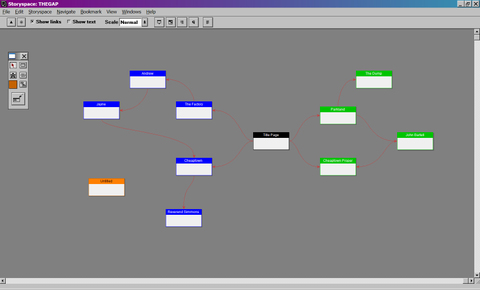Sort of a mind rendition in hypertext form–or hypertext form in truth being not only a product of the brain’s activity, but a mimicry of the thought process–brings about a piece of work that ties together yet forks into different paths of literature, critique, readers, format and outside influences that produce trends (i.e., TV drama, computer games, the internet, etc.) into a puzzle from which I am attempting to form a pattern that gives me the whole picture.
And questions such as, if there really is a downtrend in reading (and this trails off into who says so and who is reading and why), has anyone wondered if it could be the style of what is currently in vogue (and this is formed into paths of literary critique and newspaper reviewers and, I suppose, the almighty publishing houses) that is the problem?
Daniel Green at The Reading Experience posts some good responses and thoughts on the question of publishing and reading, as do many others. And I’m certainly not saying that the avant garde should be forsaken to satisfy the larger masses of sci fi, fantasy and romance readers. But I think that what I’m saying is that even as we plunge ahead into new areas of fiction and poetry and writing styles that represent evolution in thinking, there’s still a need within each to maintain the base of story. And it’s got to be a story that causes human reaction in the reader–and I’m not talking head-scratching here. I’d like to see a tear, hear a sigh, catch a glimpse of tight-lipped acknowledgement that signals understanding.
People are still reading. Who’s reading what is what’s separating and thus limiting the readership.
Which brings me to the question of hypertext audience. It can’t be just academics and their students, or technuts interested in the form rather than the narrative. Why not a hypertext in the more traditional style? Any of my middle-aged friends when questioned about hypertext bring up the form as being a pita problem. But I suspect that the detachment of some of the hypertext environment is overly emphasizing the detachment of the narrative itself and so the two together become the impediment to override. (Impediment here meaning only to those who tend towards closed-mindedness or lack a spirit of adventure, of course). But still, if folks love romance than they will read a romance in hypertext if it’s carefully constructed not to let them feel lost. They want the "lost" feeling; but what they’re escaping from is the hubby and kids of reality, not the world they’ve so willingly entered. So hypertext doesn’t necessarily have to mean ultra contemporary exploratory fiction.
Nor do the lit journals and this whole post applies to them as well. Unless you’re a writer looking to get published or you’re a lit professor, you don’t read the hundreds of literary journals out there. And even writers cancel their subscriptions eventually (after x number of rejections on their submissions, when they realize they’ve given out more money to these people than they’ll ever see even if they did get published). But what’s one of the longest lived fiction periodicals that still enjoys a high circulations?
Ellery Queen Magazine.


 The Lost Children: A Charity Anthology
The Lost Children: A Charity Anthology